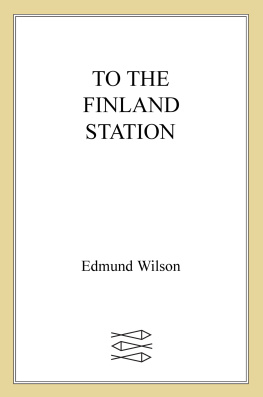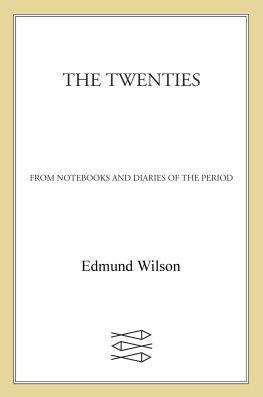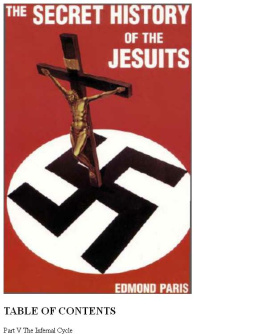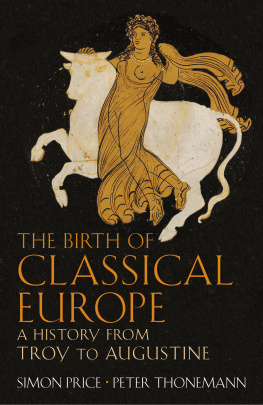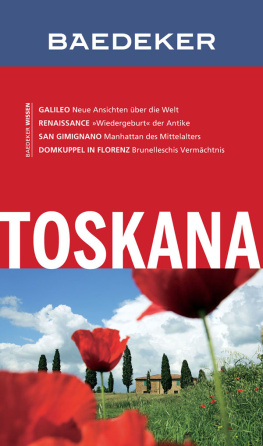EDMUND WILSON
Europe Without Baedeker
Sketches Among the Ruins of Italy, Greece and England, together with
Notes from a European Diary:
19631964

Farrar, Straus and Giroux
New York
The author and publisher have provided this e-book to you for your personal use only. You may not make this e-book publicly available in any way. Copyright infringement is against the law. If you believe the copy of this e-book you are reading infringes on the authors copyright, please notify the publisher at: http://us.macmillanusa.com/piracy.
T HIS BOOK is the result of a trip undertaken for the New Yorker magazine in the spring and summer of 1945. Chapters have been printed in Horizon.
The reporting of the things that I heard and saw is as faithful as I could make it, except in the cases of the third and fourth sections of the chapter on British officials, in which I have used fictitious names and shuffled personalities a little, and of the chapter on U.N.R.R.A. in the Abruzzi, which, though derived from fact, is fiction. Since my experience of the Abruzzi is too limited for me to work up imaginary localities which would seem satisfactorily representative, I have resorted to the perhaps questionable device of planting an invented story in real places that are called by their names and are for the most part accurately described. The people are not, however, the real ones, and I must apologize to the U.N.R.R.A. workers at Aquila, to the officer in command of the Aquila hotel and to the sindaco of the town of Orsogna for the roles that my characters are made to play. I have no reason to believe that the relations between British and Americans in Aquila were such as I have shown in this story; but the things that I have here invented are the kind of things that often did happen, and I have tried to create a typical situation.
1947
W HEN this book first came out in 1947, it was badly received in England. It was even denounced by Dean Inge. Hawthorne had the same experience when he published his book on England called Our Old Home, which was based on the seven years that he had spent there as consul in Liverpool. He was somewhat surprised to find that anything he had had to say in the way of negative criticism was received as outrageous slander. I received, he wrote at the time, several private letters and printed notices of Our Old Home from England. It is laughable to see the innocent wonder with which they regard my criticisms, accounting for them by jaundice, insanity, jealousy, hatred, on my part, and never admitting the least suspicion that there may be a particle of truth in them. The monstrosity of their self-conceit is such that anything short of unlimited admiration impresses them as malicious caricature. But they do me great injustice in supposing that I hate them. I would as soon hate my own people. This kind of patriotic reaction has seemed more characteristic of England than of any other nation. The French do not resent foreign criticism because they do not know it exists. They cannot even imagine it possible. It was amusing to remember the incessant disparagement to which we had been subjected by the visiting English. On this side of the water, on the other hand, I was scolded for being an Anglophile, and one correspondent wrote me that if I thought so much more highly of England than I did of the United States, I ought to go back and live there.
What seems to me rather curious is that, after having been five times to Englandthough usually rather brieflyand belonging as I did to a generation that had grown up on English literature, I should have had so little conception of what the English were really like. The point is that when we read English writers in youth, we assimilate them so far as we can to ourselves and treat the rest as a kind of fairy tale. One cannot find out what a people are like from seeing congenial friends who more or less share ones own interests: one has to be obliged to deal with them as they come in business or official relations, when you can see how they habitually behave. My picture is of course somewhat dated. The England that I saw at the end of the warbedevilled and bombed and deprivedis not the England of twenty years later, resigned to the loss of its imperialist role and trying to adjust itself to a social system less rigidly stratified. What this means for England of today has, it seems to me, been dramatized in a masterly way in Mr. Angus Wilsons novel Late Call, with its story of three generations of a formerly lower-middle-class family in process of turning into something else in one of the modern New Towns. As an outsider, writing at the end of the war, I could only record a few signs of this. But what, rereading Europe Without Baedeker, does today considerably embarrass meto the point of making me suppress one passageis my plugging of the virtues of the United States in contrast to England and Russia. The Anglo-Irish friend whom I call Bob Leigh was more perspicacious than I then imagined in saying that if the English didnt move in in Europe, the Americans probably would. We have done so, and not only in Europe but also in Korea and Vietnam, and have we done any better by their peoples? I used to make fun of the English assumption that the wops begin at Calais and assume, as I say in this book, that we of the United States had sought to coperate with the natives of the countries of which we had more or less taken possession, and it is true that there was a difference, at the time of which I was writing, between the English and the American approachesthough I learn that in the Pacific the Americans called the natives gooks as the English called the Jugoslavs Jugs, and that that is what they are now calling the natives in Vietnam. How we behave now I do not know. We have earned the slogan, Yanks, go home! In any case, after killing and mutilating so many Koreans and Vietnamese, we can hardly be said to have been helpful. Our talk about bringing to backward peoples the processes of democratic government and of defending the free world against Communism is as much an exploit of Anglo-Saxon hypocrisy as anything ever perpetrated by the English. And I must, also, now deflate my boast of twenty years ago that we should probably be able to avoid the evils of the modern bureaucratic state. I did not foresee the present development of our huge official bureaucracies, Pentagon, C.I.A., Internal Revenue Bureau, or that a human bureaucracy of clerks and officials, invested with special powers which are more or less mechanically exercised, would resort in the long run to a mechanical bureaucracy of computers.
The three new sections included here also first appeared in the New Yorker.
1966
T HE ENGLISH WAY OF GETTING THINGS DONE is quite distinct from the American way. It is quieter, more orderly, politer. When our ship was about to dock at London, a British pilot came aboard to take us up the Thames. The deckhands had been cleaning the deck and draining the water out of a hole next to the ladder up which he was to climb, and one of the sailors now closed the hole. The pilot, as he appeared over the side, said to the Norwegian sailor, Good morning, thanks for stopping the water, and went immediately about his business on the bridge. I was somehow impressed by this and tried to think what an American would have said. He would probably have said nothing at all or would have made some kind of wisecrack. And so, when the officials of the port came aboard, it seemed to me that ones dealings with officials in England were pleasanter and more expeditious than with those of any other country. Even when they are holding you up, there is no strain and no friction. The officials of other countries tend to behave as if they assumed you were a crook, but the British officials look up at you with a candid and friendly eye which seems to assume that you are honest. I had the impression later, in London, when I saw people getting their ration books and complying with other wartime regulations, that the whole organization of life for the war had been handled in this same calm and careful way. Compared to England after nearly five years of food rationing, fuel restrictions and the rest, the United States, in its first pangs of privation, seemed hysterical, uncertain and confused.




